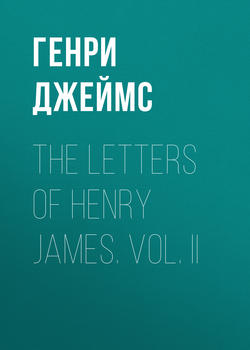Читать книгу The Letters of Henry James. Vol. II - Генри Джеймс, Henry Foss James - Страница 3
VI
Rye (continued)
(1904-1909)
To Edward Lee Childe
ОглавлениеThe name of this friend, an American long settled in France, has already occurred (vol. i. p. 50) in connection with H. J.'s early residence in Paris. Mr. Childe (who died in 1911) is known as the biographer of his uncle, General Robert E. Lee, Commander of the Confederate forces in the American Civil War.
Lamb House, Rye.
January 19th, 1904.
My dear old Friend,
You write in no high spirits—over our general milieu or moment; but high spirits are not the accompaniment of mature wisdom, and yours are doubtless as good as mine. Like yourself, I put in long periods in the country, which on the whole (on this mild and rather picturesque south coast) I find in my late afternoon of life, a good and salutary friend. And I haven't your solace of companionship—I dwell in singleness save for an occasional imported visitor—who is usually of a sex, however, not materially to mitigate my celibacy! I have a small—a very nice perch in London, to which I sometimes go—in a week or two, for instance, for two or three months. But I return hither, always, with zest—from the too many people and things and words and motions—into the peaceful possession of (as I grow older) my more and more precious home hours. I have a household of good books, and reading tends to take for me the place of experience—or rather to become itself (pour qui sait lire) experience concentrated. You will say this is a dull picture, but I cultivate dulness in a world grown too noisy. Besides, as an antidote to it, I have committed myself to going some time this year to America—my first expedition thither for 21 years. If I do go (and it is inevitable,) I shall stay six or eight months—and shall be probably much and variously impressed and interested. But I am already gloating over the sentiments with which I shall expatriate myself here.
You ask what is being published and "thought" here—to which I reply that England never was the land of ideas, and that it is now less so than ever. Morley's Life of Gladstone, in three big volumes, is formidable, but rich, and is very well done; a type of frank, exhaustive, intimate biography, such as has been often well produced here, but much less in France: partly, perhaps, because so much cannot be told about the lives—private lives—of the grands hommes there. Of course the book is largely a history of English politics for the last 50 years—but very human and vivid. As for talk, I hear very little—none in this rusticity; but if I pay a visit of three days, as I do occasionally, I become aware that the Free Traders and the Chamberlainites s'entredévorent. The question bristles for me, with the rebarbative; but my prejudices and dearest traditions are all on the side of the system that has "made England great"—and everything I am most in sympathy with in the country appears to be still on the side of it, notably the better—the best—sort of the younger men. Chamberlain hasn't in the least captured these.... But it's the midnight hour, and my fire, while I write, has gone out. I return again, most heartily, your salutation; I send the friendliest greeting to Mrs. Lee Childe and to the dear old Perthuis, well remembered of me, and very tenderly, and I am, my dear Childe, your very faithful old friend,
HENRY JAMES.
